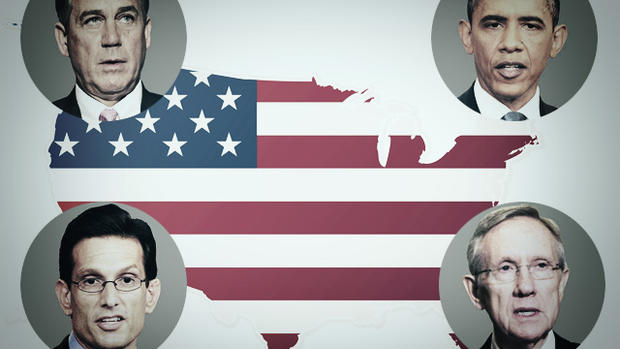Nation on brink, GOP debt plan dies in Senate
Just two hours after the Republican-led House passed a hard-fought plan to raise the debt limit, the Democrat-led Senate followed through on their vow to vote the plan down.
The vote to table the House bill, which required a simple majority, was 59-41.
The votes come just four days before the Obama administration's deadline for raising the nation's $14.3 billion debt limit. Senate Democrats will now move forward on their own plan with an eye on crating a compromise that could pass both chambers of Congress. Lawmakers plan to work through the weekend in an attempt to craft a deal and avoid what the Obama administration and economists cast as a potential economic catastrophe.
There are already signs of strain, however. Even before the Senate voted down the House bill, Senate Republican leader Mitch McConnell said he would not negotiate with his Democratic counterpart, Majority Leader Harry Reid, though he said he would consider direct negotiations with the president.
Special report: America's debt battle
House GOP - finally - passes debt limit plan
Immediately following the vote tabling the House plan, Reid and McConnell engaged in an unusual debate on the Senate floor regarding Reid's own debt plan. McConnell sought a cloture vote that would have allowed an immediate final vote on Reid's proposal with a likely unachievable 60-vote threshold for passage. Reid was left trying to delay action on his own legislation, arguing that it should face a simple-majority vote.
The House Republican plan would initially reduce spending by $917 billion over ten years and increase the debt limit enough to cover about six months. Senate Democrats say the plan is unacceptable because it would create economic uncertainty and force another painful debt limit debate at the end of the year.
House Speaker John Boehner had to withdraw a planned vote on the plan Thursday night because the Tea Party-aligned fiscal conservatives in his caucus said it did not go far enough to address the nation's debt and deficit. He was able to win enough votes for passage Friday by requiring that the next debt ceiling increase be tied to passage of a balanced budget amendment to the Constitution - something that would require a two thirds majority in both the House and the Senate.
Even with that sweetener, the bill barely passed the House, 218 to 210 - with the support of no Democrats. 22 Republicans voted against the bill, including presidential candidates Reps. Michele Bachmann and Ron Paul. Eleven of the 22 no votes were from House freshmen. Republicans needed 216 votes for passage.
An angry-sounding Boehner complained on the House floor shortly before the vote that he "stuck my neck out a mile to try to get an agreement with the President of the United States," but that "a lot of people in this town can never say yes." To cheers from his caucus, he called on Democrats and the White House to "end this crisis now."
There is virtually no chance that a balanced budget amendment could get the two-thirds majority necessary for passage in both chambers. (To go into effect, it would also need to be ratified by three-fourths of the states.) If Congress ends up passing some sort of compromise legislation between the Senate and House plans, the balanced budget amendment will almost surely be stripped out.
"Now that yet another political exercise is behind us, with time dwindling, leaders need to start working together immediately to reach a compromise that avoids default and lays the basis for balanced deficit reduction," White House press secretary Jay Carney said in a statement after the House vote.
"Senator Reid's proposal is a basis for that compromise," he continued. "It not only achieves more deficit reduction than the bill passed in the House today and puts a process in place to achieve even more savings, it also removes the uncertainty surrounding the risk of default. The President urges Democrats and Republicans in the Senate to find common ground on a plan that can get support from both parties in the House - a plan the President can sign by Tuesday."
The Senate Democratic plan would cut around $2 trillion in spending and extend the nation's borrowing authority through 2012. It's not clear that that plan has the 60 votes necessarily get out of the Senate, however, let alone pass the Republican-led House. And Boehner could simply opt not to bring the plan to the House floor.
The plan makes similar cuts to the first step of the Boehner plan, but it also includes about $1 trillion in savings tied to ending the wars in Iraq and Afghanistan -- something the United States is already planning to do. Republicans say the Reid plan is grounded in accounting tricks and doesn't do enough to address the nation's massive deficit and debt problem.
The House plans to take up Reid's bill Saturday to show it cannot pass the House.
Without a deal, the United States will soon run out of money, causing the nation to stop payment on some of its obligations, potentially including Social Security payments, and risk default on its debt. Default would lower the U.S. credit rating, having a negative impact on the global economy as well as increasing the cost of borrowing for the government and individuals.

